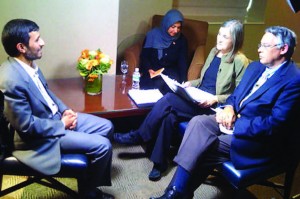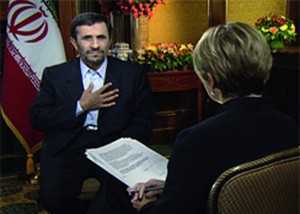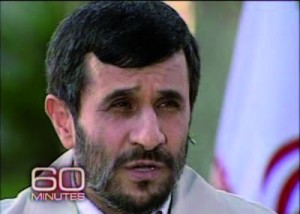Interviewing Mahmoud Ahmadinejad
Next: Argumentative Ahmadinejad: Quotes from Interviews
—–


———————————————
“President Ahmadinejad is a difficult man to pin down because his answers are often questions and he does not feel compelled to respond to questions as posed,” says the host of PBS talk show Charlie Rose. When asked a question, he lectures, turning the question towards other subjects, puts responsibility and accountability on other power players in Iran, and ultimately does not respond the question or acknowledge the issue.
The Campaign has reviewed more than 20 interviews that have been conducted over the past 5 years, particularly the ones after the Iranian election in 2009. Below is a list of major arguments and techniques he employs to defend Iran’s human rights record before foreign journalists:
- Responding to questions with questions
- Answering specific questions with vague or philosophical responses
- Criticizing human rights violations within in the United States, or by the U.S. government against people in other countries
- Saying that the Iranian judiciary is independent and he has no influence on its actions and deflecting blame onto the judiciary or legislative branches
- Giving long answers to questions, leaving no space for more human rights questions
- Defending the situation of freedom and democracy in Iran in general terms
- Questioning the reliability of interviewers’ arguments and the accuracy of their questions
- Denying the universality of human rights and claiming that human rights are imposed by the West. Avoiding direct “yes” or “no” answers
- Challenging the ownership and bias of foreign media.Asking the interviewer to respond to his questions on human rights violations in the U.S.
- Ignoring the facts and sticking to his own narrative, including political responses unrelated to specific questions on human rights
Back to Main ———————————————————————————— Next




